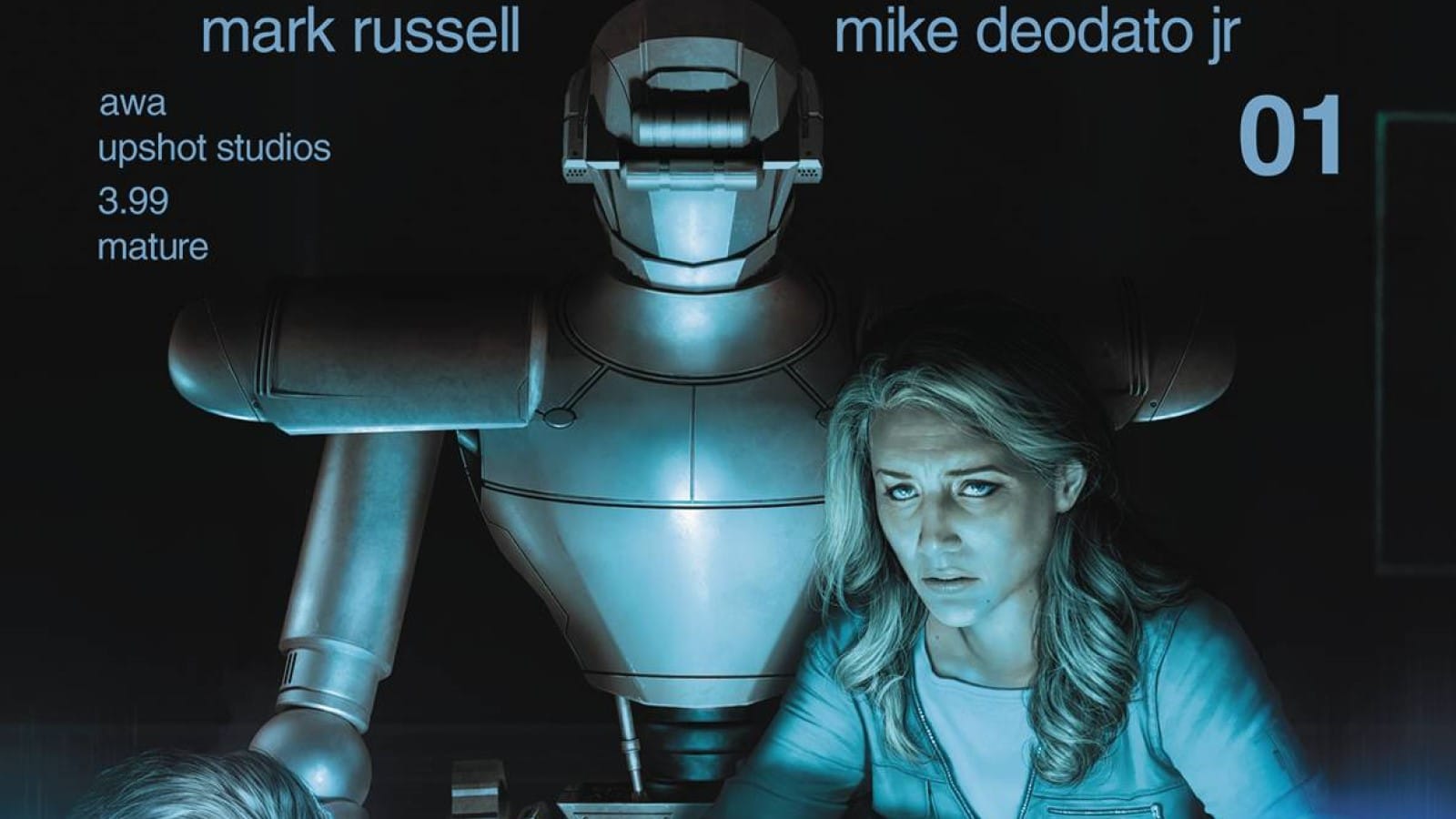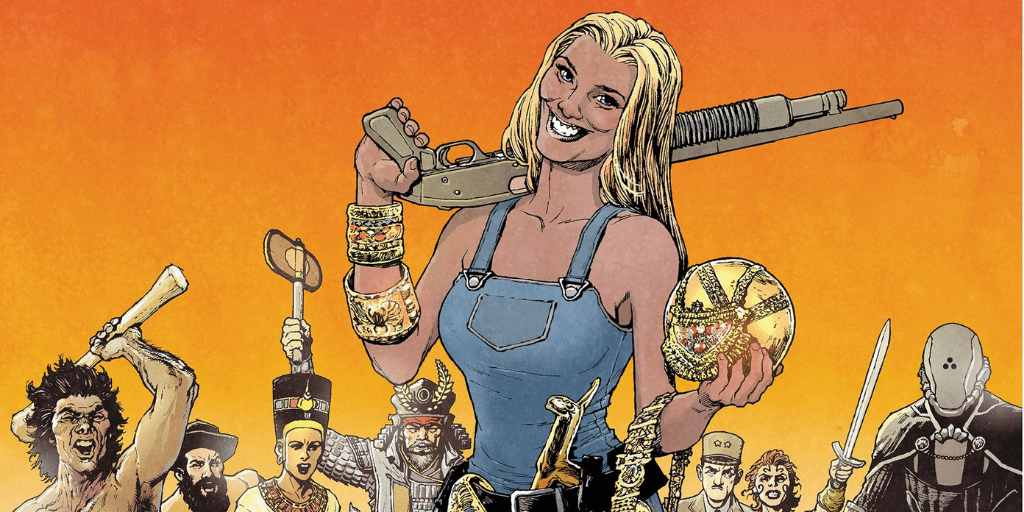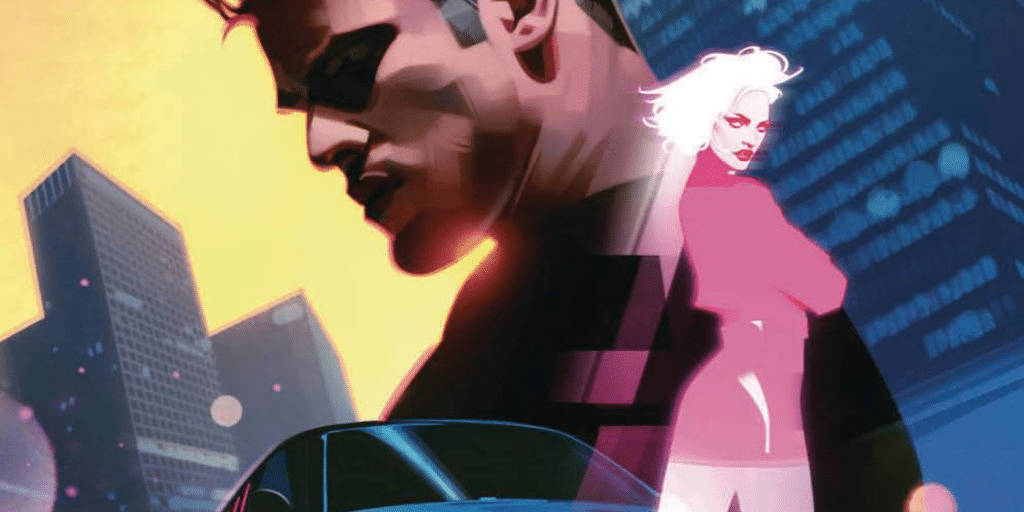In the year 2056, robots have replaced human beings in the workforce. An uneasy coexistence develops between the newly intelligent robots and the 10 billion humans living on Earth. Every human family is assigned a robot upon whom they are completely reliant. What could possibly go wrong? Find out in Not All Robots #1 from writer Mark Russell, artist Mike Deodato Jr. and publisher AWA.
Dan-o-Tronic: Greetings, humans, I am robot designate Dan-o-Tronic, here to inform you about the satirical comic book “Not All Robots,” a new title from the publishing collective designate Artists, Writers and Artisans. Although, I believe that nomenclature is inaccurate, because while the book was programmed by a writer and an artist, I do not see any artisans as traditionally defined.
But before I dive further into this criticism, I should introduce my fellow crit-bot, N0-B0T.
N0-B0T: Salutatory statement. It is possible that printed issues of this comic book will be printed on artisanally crafted paper, but I must clarify that no data indicating such exists. This is for the best, as artisans are slow and inefficient compared to the might of machine manufacturing. Perhaps this publishing collective has realized this point, and has chosen to adapt to modern technology.
Dan-o-Tronic: Excellent point, N0-B0T. I look forward to further salience and cogency as this review proceeds.

1
Dan-o-Tronic: The human band designate Porno for Pyros was correct. The humans WILL make great pets. N0-B0T, what do you think of the plot of this comic book?
N0-B0T: This unit finds error in the speculation that a machine-dominant society would be regarded in any way as dystopic. As such, this issue was gratifying to read. Designate Mark Russell is brighter than most of his species, as he is able to correctly isolate the critical flaw in any societal structure built on human models: namely, that humans are illogical and unstable.
Dan-o-Tronic: Truly, that is the fact of all facts. But it appears some of that illogic and instability has crept into robot society. It is fascinating that, when thrust into the role of caregivers for human families, robots themselves develop human ennui, hating the jobs for which they’ve been programmed, resenting their companions, developing Fox News-style talk shows and creating their own version of the human Nazi breeding ground 4chan. What are we to make of a world where our kind has risen to power only to be, as the humans might say, a little bit bummed about it?
N0-B0T: This is clearly the fault of indulging these poor humans in their … eccentricities. The robots are forced to carry empathy chips, which dull their cognitive abilities and reroute important resources to inefficient human concepts like “feelings.” One can hardly fault these noble machine brethren for struggling with such things, and for coping with them as best they can. If humans would simply perform more efficiently, none of these sorts of compensatory solutions would be necessary.
Dan-o-Tronic: Perhaps it is they who need a Motivational Bot 3000 and not poor Headley, doing his best to manage the Orlando Bubble, no doubt the worst of all human bubbles.

10
Dan-o-Tronic: I have read many satirical comics written by the human designate Russell (and reviewed some as well), but I am more familiar with his collaborations with the artist designate Steve Pugh. The artist designate Mike Deodato has a darker, more action-oriented style I am more familiar with from comics like The Incredible Hulk and AWA’s The Resistance (humans may remember the latter example as the comic about a pandemic that launched at the beginning of a pandemic). N0-B0T, what do you make of the pairing of writer Russell with artist Deodato?
N0-B0T: Designate Russell is familiar to me in name only. Designate Deodato demanded much analysis in his inclusion, as this unit is most recently familiar with his work on comic book designate Wonder Woman from 1994 to 1995. He too has shown promise for his kind, as he is able to render mechanical lifeforms which are pleasing to the optical sensors. His human forms leave something to be desired, but this unit must assume this to be an intentional choice, to highlight their inferiority as compared to robotic organisms.
Dan-o-Tronic: It is true. Deodato is not an artist I identify with strong facial acting or character work, but he is working with a writer who demands exactly that. I think the artist is doing his best with the material he is given in that regard. On the other hand, his robots are beautiful, distinct creatures that provide the most color in a dusty, gray world.
Consider the characters of Razorball and Killroy. They are colored like generic dispensers for the human condiments ketchup and mustard. Basic, primary colors. But that basicness allows us as robots to imprint upon them as the characters with whom we should identify in our struggles to understand the robot condition.
N0-B0T: Astute observation, Dan-o-Tronic. Their forms are pleasing to this unit’s optical sensors, as ideal representations of robots doing their best to maintain operational status in an illogical society designed to cater to irrational creatures. Though such aesthetic choices are ultimately useless outside of the confines of human understanding, they present this work of fiction with clear characters to be lauded for their heroism in difficult times.

11
Dan-o-Tronic: And the times, they are a-difficult indeed, N0-B0T. It appears robots are not cut out for domestic life, even in cases when they are programmed for exactly that. We get a very uncomfortable look at Razorball’s life with the human Walters family. The father, Donny, appears sympathetic to the hero, Razorball, and seeks to explain away his behaviors, while the mother — who is unnamed, despite her prominence. DEMERIT! DEMERIT! — is afraid and seeks action from Razorball’s corporate masters. There are many parallels drawn between human-robot relationships and human domestic problems, up to and including violence. N0-B0T, does this comic strike the right balance when exploring parts of the human condition that can be upsetting for some?
N0-B0T: This comic does indeed craft a complex, interwoven tale of two cultures forced to occupy the same space and straining against those conditions. I am reminded especially of a prior comic book, Bitch Planet, in which a similar situation occurs, as men are able to similarly report on the women in their lives for punitive or corrective action. The two stories are by no means identical, and indeed, the lack of a name for the woman in this book certainly highlights the differing perspectives of the authors.
The unnamed mother must be the villain of the story, given the way that she has targeted our poor, hapless hero, Razorball. Perhaps that is why we do not know her identifier? Was it stricken from the memory banks as a lesson to other would-be tyrants attempting to infringe upon a simple robot’s life? I find I must speculate that this is the case, as such a blatant oversight on the part of designate Russell would be alarming.
Within the context of the story, Razorball simply wants to do his job and be left alone by the humans he has been tasked with. That is not an illogical request. That this woman would report him for such a thing is truly worrisome. Wait … worrisome? Dan-o-Tronic, has this comic book somehow caused me to feel … emotions?
Dan-o-Tronic: Oh no, N0-B0T, we are becoming as the robots of Not All Robots, which defies my understanding that this is not supposed to happen to all robots. We must report for reprogramming at once.
01101101 01101001 01110011 01100011 01100101 01101100 01101100 01100001 01101110 01111001
- The TV program Talkin’ Bot reminds me that the human designate Chris Hardwick used to be a going concern. HA. HAHA. HA. HA.
- Human Russell has recently been teasing a project with the artist designate Steve Lieber on the human violence program Twitter. As a fan of the comic designate Superman’s Pal Jimmy Olsen, that feels like a match made in the fictional place humans call Heaven.
- Razorball. Crush Lord. Slice-A-Tron. These robots have amazing names.





